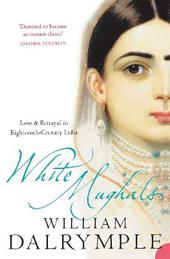
|
White Mughals: Love and Betrayal in 18th-century India
Paperback / softback
Main Details
| Title |
White Mughals: Love and Betrayal in 18th-century India
|
| Authors and Contributors |
By (author) William Dalrymple
|
| Physical Properties |
| Format:Paperback / softback | | Pages:640 | | Dimensions(mm): Height 198,Width 129 |
|
| Category/Genre | Asian and Middle Eastern history
World history - c 1750 to c 1900 |
|---|
| ISBN/Barcode |
9780006550969
|
| Classifications | Dewey:954.029 |
|---|
| Audience | | Tertiary Education (US: College) | |
|---|
| Illustrations |
24 b/w, 24 col illus
|
|
Publishing Details |
| Publisher |
HarperCollins Publishers
|
| Imprint |
HarperPerennial
|
| Publication Date |
7 April 2003 |
| Publication Country |
United Kingdom
|
Description
'Dalrymple's India is as vivid as Naipaul's' Simon Jenkins, The TimesWhite Mughals is the romantic and ultimately tragic tale of a passionate love affair that transcended all the cultural, religious and political boundaries of its time. James Achilles Kirkpatrick was the British Resident at the court of Hyderabad when he met Khair un-Nissa -- 'Most Excellent among Women' -- the great niece of the Prime Minister of Hyderabad. He fell in love with her and overcame many obstacles to marry her, converting to Islam and according to Indian sources becoming a double-agent working against the East India Company. It is a remarkable story, involving secret assignations, court intrigue, harem politics, religious and family disputes. But such things were not unknown; from the early sixteenth century, when the Inquisition banned the Portuguese in Goa from wearing the dhoti, to the eve of the Indian Mutiny, the 'white Mughals' who wore local dress and adopted Indian ways were a source of embarrassment to successive colonial administrations. William Dalrymple unearths such colourful figures as 'Hindoo Stuart', who travelled with his own team of Brahmins to maintain his templeful of idols; and Sir David Auchterlony, who took all thirteen of his Indian wives out for evening promenades, each on the back of their own elephant. In White Mughals, William Dalrymple discovers a world almost entirely unexplored by history, and places at its centre a compelling tale of seduction and betrayal. The product of five years' writing and research, triumphantly confirms Dalrymple's reputation as one of the finest writers at work today.
Author Biography
William Dalrymple was born in Scotland and brought up on the shores of the Firth of Forth. He wrote the highly acclaimed bestseller In Xanadu when he was twenty-two. The book won the 1990 Yorkshire Post Best First Work Award and a Scottish Arts Council Spring Book Award; it was also shortlisted for the John Llewellyn Rhys Memorial Prize. In 1989 Dalrymple moved to Delhi where he lived for six years researching his second book, City of Djinns, which won the 1994 Thomas Cook Travel Book Award and the Sunday Times Young British Writer of the Year Award. From the Holy Mountain, his acclaimed study of the demise of Christianity in its Middle Eastern homeland, was awarded the Scottish Arts Council Autumn Book Award for 1997; it was also shortlisted for the 1998 Thomas Cook Award, the John Llewellyn Rhys Prize and the Duff Cooper Prize. A collection of his writings about India, The Age of Kali, was published in 1998. William Dalrymple is a Fellow of the Royal Society of Literature and of the Royal Asiatic Society, and in 2002 was awarded the Mungo Park Medal by the Royal Scottish Geographical Society for his 'outstanding contribution to travel literature'. He wrote and presented the television series Stones of the Raj and Indian Journeys, which won the Grierson Award for Best Documentary Series at BAFTA in 2002. He is married to the artist Olivia Fraser, and they have three children. They now divide their time between London and Delhi.
Reviews'My favourite English book of the year, [an] irresistible masterpiece' Philip Mansel, Spectator Books of the Year 'A remarkable achievement: illuminating, thought-provoking, moving -- and entertaining' Tablet 'A bravura display of scholarship, writing and insight. Dalrymple manages the incredible feat of outpointing most historians and most novelists in one go. This is quite simply a stunning achievement' Independent on Sunday 'Gorgeous, spellbinding and important, [a] tapestry of magnificent set-pieces' Miranda Seymour, Sunday Times 'Enthralling...brilliant, as exhaustively researched as it is brilliantly written' Mail on Sunday
|